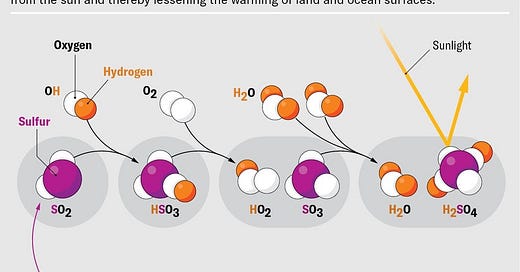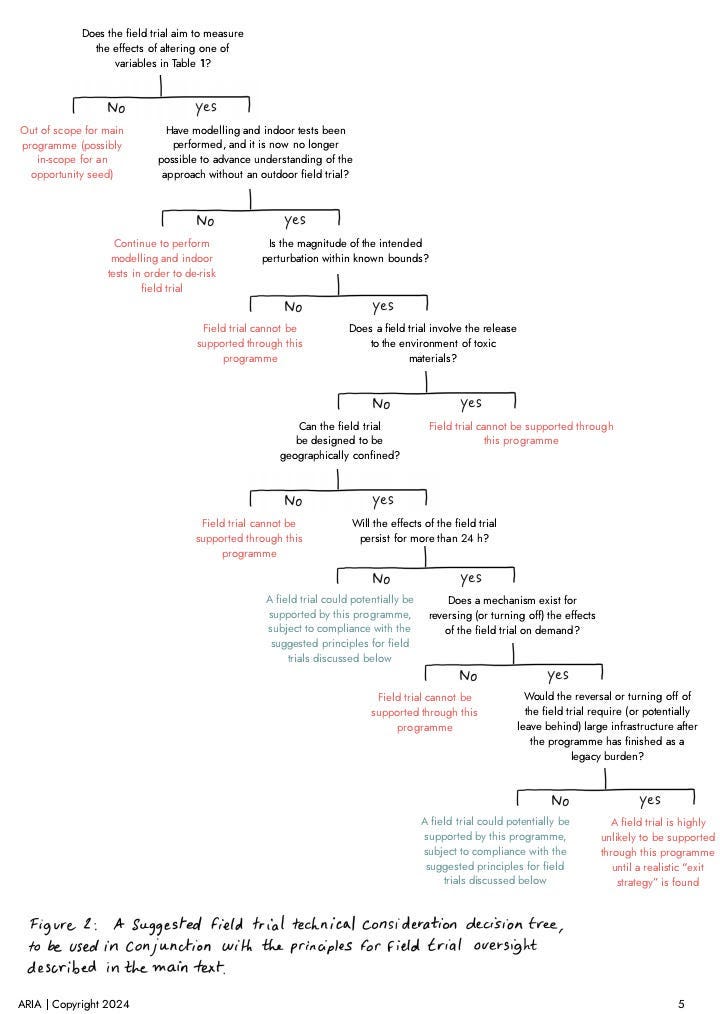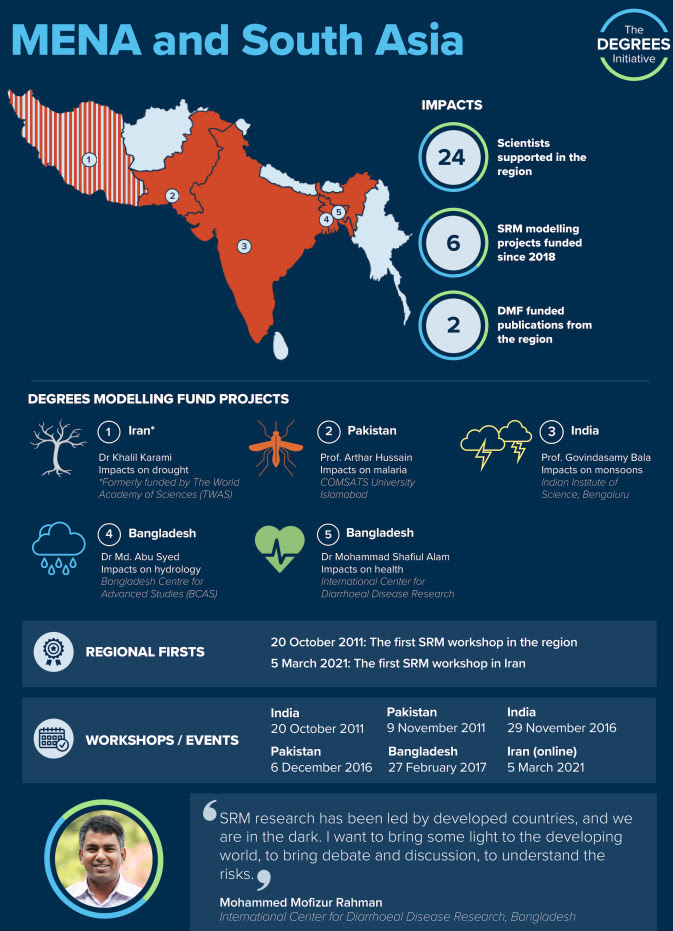The Solar Geoengineering Updates Newsletter (May'2024)
Welcome to the Solar Geoengineering Updates Newsletter, a monthly newsletter that updates you on the developments of everything SRM-related.
RESEARCH PAPERS
The security implications of geoengineering:blame,imposed agreement and the security of critical infrastructure
Nightingale, P., & Cairns, R. (2014). The security implications of geoengineering: Blame, imposed agreement and the security of critical infrastructure. Sussex University: Climate Geoengineering Governance Working Paper Series, 18.
The political value of letting hopes die
Howard, D. (2024). The political value of letting hopes die. Critical Review of International Social and Political Philosophy, 1-24.
Dependency of the impacts of geoengineering on the stratospheric sulfur injection strategy – Part 2: How changes in the hydrological cycle depend on the injection rate and model used
Laakso, A., Visioni, D., Niemeier, U., Tilmes, S., & Kokkola, H. (2024). Dependency of the impacts of geoengineering on the stratospheric sulfur injection strategy–Part 2: How changes in the hydrological cycle depend on the injection rate and model used. Earth System Dynamics, 15(2), 405-427.
Stratospheric transport and tropospheric sink of solar geoengineering aerosol: a Lagrangian analysis
Sun, H., Bourguet, S., Luan, L., & Keith, D. (2024). Stratospheric transport and tropospheric sink of solar geoengineering aerosol: a Lagrangian analysis. npj Climate and Atmospheric Science, 7(1), 115.
Abrupt reduction in shipping emission as an inadvertent geoengineering termination shock produces substantial radiative warming
Yuan, T., Song, H., Oreopoulos, L., Wood, R., Bian, H., Breen, K., ... & Platnick, S. (2024). Abrupt reduction in shipping emission as an inadvertent geoengineering termination shock produces substantial radiative warming. Communications Earth & Environment, 5(1), 281.
Response of the Southern Hemisphere extratropical cyclone climatology to climate intervention with stratospheric aerosol injection
Reboita, M. S., Gabriel Martins Ribeiro, J., Machado Crespo, N., da Rocha, R. P., Odoulami, R. C., Sawadogo, W., & Moore, J. C. (2024). Response of the Southern Hemisphere extratropical cyclone climatology to climate intervention with stratospheric aerosol injection. Environmental Research: Climate.
Toward an evidence-informed, responsible, and inclusive debate on solar geoengineering: A response to the proposed non-use agreement
Parson, E. A., Buck, H. J., Jinnah, S., Moreno‐Cruz, J., & Nicholson, S. (2024). Toward an evidence‐informed, responsible, and inclusive debate on solar geoengineering: A response to the proposed non‐use agreement. Wiley Interdisciplinary Reviews: Climate Change, e903.
Chinese public’s perceptions and understanding of the potential roles of solar climate engineering for reducing climate change risks
Zhang, Z., Huisingh, D., & Crabbe, M. J. C. (2024). Chinese public’s perceptions and understanding of the potential roles of solar climate engineering for reducing climate change risks. Environment, Development and Sustainability, 1-20.
Africa's Climate Response to Marine Cloud Brightening
Odoulami, R. C., Hirasawa, H., Kouadio, K., Patel, T. D., Quagraine, K. A., Pinto, I., ... & New, M. G. (2024). Africa's Climate Response to Marine Cloud Brightening (No. EGU24-6419). Copernicus Meetings.
A paradigm shift? African countries call for the non-use of solar geoengineering at UN Environment Assembly
Biermann, F., & Gupta, A. (2024). A paradigm shift? African countries call for the non-use of solar geoengineering at UN Environment Assembly. PLOS Climate, 3(5), e0000413.
Evolution of the Climate Forcing During the Two Years after the Hunga Tonga-Hunga Ha'apai Eruption
Schoeberl, M., Schoeberl, M. R., Wang, Y., Taha, G., Zawada, D. J., Ueyama, R., & Dessler, A. (2024). Evolution of the Climate Forcing During the Two Years after the Hunga Tonga-Hunga Ha'apai Eruption. Authorea Preprints.
Public engagement for inclusive and sustainable governance of climate interventions
Fritz, L., Baum, C. M., Low, S., & Sovacool, B. K. (2024). Public engagement for inclusive and sustainable governance of climate interventions. Nature Communications, 15(1), 4168.
Deciphering public attention to geoengineering and climate issues using machine learning and dynamic analysis
Debnath, R., Zhang, P., Qin, T., Alvarez, R. M., & Fitzgerald, S. D. (2024). Deciphering public attention to geoengineering and climate issues using machine learning and dynamic analysis. arXiv preprint arXiv:2405.07010.
Analysis of the global atmospheric background sulfur budget in a multi-model framework
Brodowsky, C. V., Sukhodolov, T., Chiodo, G., Aquila, V., Bekki, S., Dhomse, S. S., ... & Peter, T. (2024). Analysis of the global atmospheric background sulfur budget in a multi-model framework. Atmospheric Chemistry and Physics, 24(9), 5513-5548.
The Evolving International Climate Change Regime: Mitigation, Adaptation, Reflection
Wiener, J. B., & Felgenhauer, T. (2024). The Evolving International Climate Change Regime: Mitigation, Adaptation, Reflection. Texas A&M Law Review, 11(2), 451-485.
A Living Assessment of Different Materials for Stratospheric Aerosol Injection—Building Bridges Between Model World and the Messiness of Reality
Visioni, D., Quaglia, I., & Steinke, I. (2024). A living assessment of different materials for stratospheric aerosol injection—Building bridges between model world and the messiness of reality. Geophysical Research Letters, 51(10), e2024GL108314.
High-resolution stratospheric volcanic SO2 injections in WACCM
Axebrink, E., Sporre, M. K., & Friberg, J. (2024). High-resolution stratospheric volcanic SO 2 injections in WACCM. EGUsphere, 2024, 1-19.
Sensitivities of Marine Cloud Brightening Studied with a Lagrangian Cloud Model
Rowland, Z. C., Hoffmann, F., Glassmeier, F., Steinke, I., & Russchenberg, H. (2024). Sensitivities of Marine Cloud Brightening Studied with a Lagrangian Cloud Model (No. EGU24-4114). Copernicus Meetings.
Climate impact of marine cloud brightening solar climate intervention under a susceptibility based strategy simulated by CESM2
Chen, C. C., Richter, J. H., Lee, W. R., Tye, M. R., MacMartin, D. G., & Kravitz, B. (2024). Climate impact of marine cloud brightening solar climate intervention under a susceptibility based strategy simulated by CESM2. Authorea Preprints.
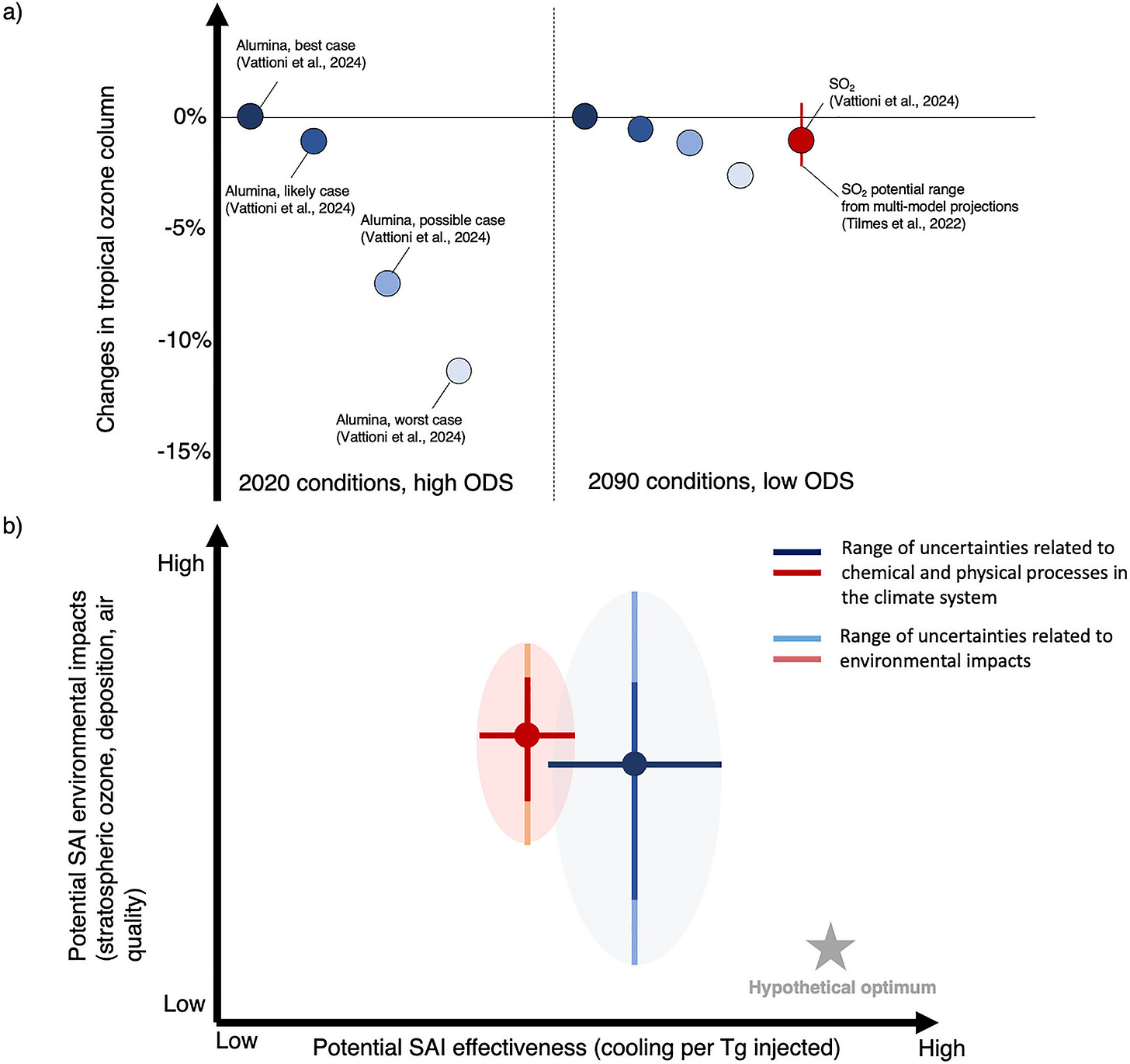


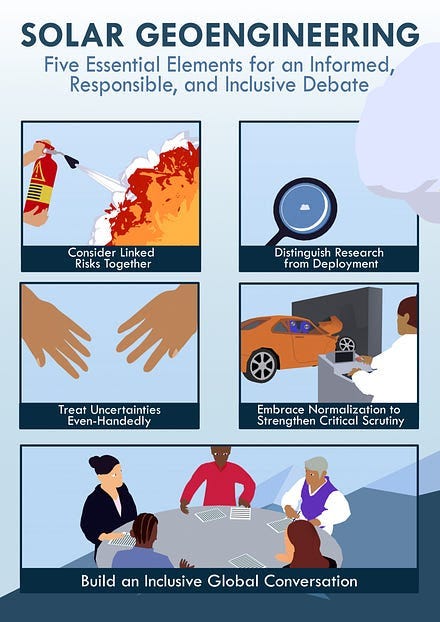
WEB POSTS
A trial of cloud-brightening technology sparks controversy in a California city (NBC News)
A Test of Cloud-Brightening Machines Poses No Health Risk, Officials Say (The New York Times)
From Pollution to Solution (Cremieux Recueil)
WashU researchers will explore stratospheric aerosol injection with a $1.5 million grant from the Simons Foundation (Newswise)
Blue-sky thinkers block the sun to fight climate change (Financial Review)
Facing the Ruptures: A Youth Perspective on Hope and the Geoengineering Debate (UArctic)
City Puts Climate Cooling Research Project Aboard USS Hornet On Pause (Alameda Neighborhood News)
Untangling Fact From Fiction In The Public’s Perception Of Solar Geoengineering (DSG)
Autonomous solar-powered catamarans for enhanced marine cloud brightening (pv magzine)
Dimming the sun to cool the earth: Is solar geoengineering the future? (NZZ)
Shady Science: The Dangers of Secret Solar Geoengineering (Atmos)
Veteran climate diplomat to advise geoengineering startup (Axios)
SilverLining Announces $20.5 Million in Funding to Advance its Governance and Equity Initiatives on Near-Term Climate Risk and Climate Intervention (Silver Lining)
Toward some Orientation in a Labyrinth of Expectations and Concerns —Co-CREATE Project (Medium)
African scientists gather in Cape Town to develop collaborative SRM research (The Degrees Initiative)
Warning that solar geoengineering could cause unexpected regional heating (Royal Society of Chemistry)
NASA Balloons Head North of Arctic Circle for Long-Duration Flights (NASA)
The Need for Geoengineering (HPAC)
Honest dialogue is needed to help build consensus around solar radiation modification technology (The Conversation)
THESIS
Emerging Anticipatory Governance of Solar Geoengineering: Analysing Its Nature And Implications
Unpacking Solar Geoengineering Governance Challenges: A critical interpretative review of the state-of-the-art and implications for the design of anticipatory governance

PROGRAM THESIS
ARIA Programme Thesis: Exploring Options for Actively Cooling the Earth
JOB OPPORTUNITIES
Research Associate in Public Perception of Climate Geoengineering at The University of Manchester | Deadline to apply: 07 June 2024
"We are looking to appoint an outstanding Research Associate to undertake research on responsible innovation and stakeholder engagement as part of the Conditions for Responsible Research of Solar Radiation Modification – Analysis, Co-Creation, and Ethos (Co-CREATE) project, funded by Horizon Europe. The post holder will undertake a range of research tasks in collaboration with the international and multidisciplinary research team, relating to public engagement on the conditions for responsible research of solar radiation modification (SRM, also called solar geoengineering), including expert and stakeholder interviews, deliberative workshops, and an international citizen survey."
Postdoc High-fidelity Computations of Aerosol Dynamics in Stratospheric Aircraft Wakes at TU Delft University of Technology
"In this postdoc position, you will form part of a consortium of researchers at ETH Zurich, the Paul Scherrer institute, the Physical Meteorological Observatory, the University of West Indies and ITS Indonesia with the goal of accurately quantifying the physics and effects of SAI. Your role will be to combine large-eddy simulations with particle evolution models to initially examine near-wake aerosol dynamics, then to study long-term aerosol wake evolution. This will provide input to predictions of large-scale aerosol properties which will be employed in global climate simulations. The results of these simulations will be used in case studies quantifying local impacts, with detailed studies to be performed for the West Indies and Indonesia. The anticipated outputs of this consortium are crucial for decision makers, who should have realistic assessments of the risks associated with SAI techniques before considering their incorporation into global warming management strategies."
BOOK
Learning from Weather Modification Law for the Governance of Regional Solar Radiation Management By Manon Simon
REPORT
Solar Radiation Modification (SRM): Intractable Governance and Uncertain Science
UPCOMING EVENTS
(NEW) Governing Prometheus. Ethical Reflections On Risk & Uncertainty In Solar Climate Engineering Research | 19 June 2024 | TU Delft University
Fourteenth GeoMIP Workshop | Ithaca, USA | 10-12 July 2024
RFF 2024 SRM Social Science Workshop: Cooperative vs. Non-Cooperative Interventions | 19-20 September 2024 | Washington, DC.
GUIDELINES:
Sync selected events to your default calendar in these simple steps:
1) Click on the event you want to sync.
2) Tap the menu icon (three vertical lines) at the top left.
3) Choose 'Share.'
4) Pick your default calendar.
5) Save the event.
Sync the entire Teamup Calendar to your default calendar with these simple steps:
1) Tap the menu icon (three vertical lines) at the top right.
2) Choose 'Preferences.'
3) Click 'iCalendar Feeds.'
4) Copy the URL shown for 'Solar Geoengineering Events / SRM Deadlines.'’
5) Paste the URL into your default calendar settings (Open Google Calendar in your web browser if you are using Gcal).
6) Click 'Subscribe' or 'Add Calendar.'
For more detailed instructions, visit: https://calendar.teamup.com/kb/subscribe-to-teamup-icalendar-feeds/
You can directly sync all Solar Geoengineering events to your default calendars by pressing the link below:
FACT SHEETS
A short summary of Degrees Initiative funded projects in Africa, Asia and Latin America (The Degrees Initiative)
PODCASTS
Warm pool & SAI - Günther (FIXED) | Reviewer 2 does geoengineering
"Moritz Günther tries valiantly to get @geoengineering1 to understand the atmospheric dynamics of SAI's impacts on the warm pool, but it's rather like watching him trying to train a baboon to use Photoshop - there's some engagement, and the occasional flash of comprehension before it all gets too much for him.
NB this is the FIXED version - the original had a couple of important errors of sign from Günther. If you've listen to the old version, pls see this important author note "the part where I say it's destabilising... should actually be stabilising... roughly at 1:10:30 - 1:11:00. The part where I say we would need less aerosol if the Brewer-Dobson circulation mechanism exists but we would actually need more is around 1:21:30 - 1:22:00." (timestamps from old episode) And BTW, props to him for a) checking b) fessing up. Science progresses one correction at a time.
Günther, M., Schmidt, H., Timmreck, C., and Toohey, M.: Why does stratospheric aerosol forcing strongly cool the warm pool?, EGUsphere [preprint], https://doi.org/10.5194/egusphere-2024-429, 2024."
Controlling MCB - Walker Lee Part 1 | Reviewer 2 does geoengineering
"What control can we exercise over MCB? Should it be confined to small, climatically sensitive areas - or expanded at great cost, to minimise inter-regional disparities? Walker Lee discusses the issue in depth. (See PT 2 for a discussion on disability and diversity).
Jack's first paper:
https://doi.org/10.22541/essoar.171322700.02512514/v1
Jack's second paper: https://doi.org/10.22541/essoar.171201044.45268441/v1"
Disability & ideological diversity in academia - Walker Lee, Part 2 | Reviewer 2 does geoengineering
"We've extracted this very interesting discussion from Walker Lee's new episode, because a) it's a standalone section and b) the main episode was already quite long. Here, Walker Lee describes in vibrant and very personal terms his own academic journey, touching on important issues of ideological diversity and disability discrimination. It's not trad R2, but we liked it. Enjoy!"
Could we use a space umbrella to cool down the planet? | The Public's Radio
"Literally blocking out the sun may sound extreme, but scientists are debating whether using dust particles to reflect sunlight away from the Earth could be a temporary solution if climate change gets out of control."
Could there be a just solar geoengineering?—w/ Shuchi Talati, Founder of The Alliance for Just Deli | Reversing Climate Change
"Solar geoengineering. It's not just a question of whether or not to do it, but of how it might be done and why.
This week we are joined by Shuchi Talati, founder of The Alliance for Just Deliberation on Solar Geoengineering, to talk about who is making decisions about solar geoengineering and whether or not populations most vulnerable to climate change have a seat at the table.
Solar geoengineering or “Solar Radiation Modification/Management (SRM)” is the large-scale and intentional intervention to increase the amount of sunlight reflected back into space. The purpose is to temporarily limit temperature increase.
Shuchi walks us through why the Alliance is not for or against SRM, why refusing to discuss or research RSM is potentially an inherently privileged standpoint, and why she believes we should center voices from regions already experiencing horrific climate impacts.
Listen in to find out who is currently researching SRM, what the potential risks and benefits are, and how the Alliance plans to make such a controversial topic more open and accessible."
Blocking out the Sun | Tech Zero
"It might sound like science fiction, but a mix of scientists and venture capitalists are working on plans to block the sun to slow global warming."
YOUTUBE VIDEOS
Climate Interventions: Solar Geoengineering | The Institute for Science & Policy
"In our three-part Climate Interventions series, we look at the scientific understanding and uncertainties around a range of interventions to reduce greenhouse gas emissions and cool the planet, along with a robust discussion on ethics, risks, and governance.
In this session, we are exploring solar geoengineering approaches, also known as solar radiation modification/management (SRM), which seek to cool the planet by reflecting some of the incoming energy back to space. To date, most of the research approaches have been restricted to computer modeling. Some proponents, however, are looking to field experiments, and perhaps ultimately, wide-scale deployment. While some options might help ameliorate the impacts of climate change, they also might pose serious risks. Join a panel of experts for breakfast at the Denver Museum of Nature and Science exploring the latest deliberations around research, governance, impacts, and more."
Can geoengineering help us solve climate change? | The Excerpt | USA TODAY
"As the world warms and aspirations to reach net-zero carbon emissions slide further and further away, climate scientists and engineers are looking at solutions, that to some, might sound like they’re straight out of science fiction. By taking on climate control with technology, experts say geoengineering can be a tool to help mitigate and remove greenhouse gases from the climate system and may be essential to reducing global temperatures. Wake Smith, author of “Pandora’s Toolbox: The Hopes and Hazards of Climate Intervention,” and a lecturer at the Yale School of the Environment, joins The Excerpt to discuss these developments in climate intervention."
Imitating Volcanoes | ToSaveTheWorld
"John Nissen, Robert Tulip, Doug Grandt, and Robin Collins belong to webinar groups studying Stratospheric Aerosol Injection (SAI) as a way of cooling the planet by the same means as volcanoes do. Greg Evans is an expert on aerosols at U of Toronto. We discuss the pros and cons of attempting such a project at full scale."
SAI | ToSaveTheWorld
Fire from Ice | Daniel Kieve
"This song by Daniel Kieve is about the need for direct cooling technology to help achieve climate repair (including a reference to brightening the clouds to turn the tide on our otherwise grim future."
Cooling Earth: Can Iron Filings Reflect Our Way Out? | Daniel Izzo
"Your concern about global warming and the urgency to find solutions is very valid. The idea of creating a cloud to reflect sunlight and cool the planet, known as solar geoengineering, is an interesting and complex topic. Let's break down the key points of your proposal and explore its feasibility."
Critical Youth Talks on Solar Geoengineering | MindOurFuture!
"In the first event hosted by Mind Our Future!, youth and scholars gathered to discuss critical approaches to the topic of solar geoengineering, its governance, and the surrounding debate. The event featured Dr. Rak Kim, who shared insights on solar geoengineering as a case of problem shifting where focus is diverted away from addressing the root causes of climate change. The event also featured Dr. Rolando Vázquez Melken who approached solar geoengineering from a decolonial perspective, critiquing the fundamental thought that we could think to change the atmosphere before we change ourselves."
I Asked The UK Government About Geoengineering Projects | Lewis Brackpool
"Last month, I submitted seven comprehensive Freedom of Information requests to various governmental departments, seeking details about any geoengineering projects in the UK. This included inquiries about research initiatives, publications, funding sources, public awareness and consent, involvement of airliners, stakeholder engagement, and more.
In this video, I’ll share the responses I’ve received from two departments. All information will be made available in the video description for you, the viewer, to review. This investigation is far from over, with ongoing requests pending and more revelations to come."
An Alternative Rationale for Solar Geoengineering | Belfer Center
An Energy Policy Seminar featuring Wake Smith, Research Fellow at the Mossavar-Rahmani Center for Business and Government and Lecturer at the Yale School of the Environment. Smith gave a talk on "Frosted Tips: An Alternative Rationale for Solar Geoengineering."
Does Cirrus Cloud Thinning Work? | ToSaveTheWorld
Understanding Climate Geoengineering -with Professor Holly J. Buck | THE GEOSTRATA
"Professor Buck is an Assistant Professor at the University of Buffalo. She talks to Team Geostrata about themes ranging from global environmental governance, and environmental policy, to public participation in emerging technologies for ensuring climate equity."
Solar radiation management could cool the planet. But at what cost? | Financial Times
"2023 was declared the hottest year ever recorded, and our planet continues to heat up. It’s cast the spotlight on one of the more niche climate cooling solutions, solar radiation management, or SRM.
SRM works on the principle that the Earth can be cooled by reflecting some of the sun’s rays back into space. But as the FT’s Aime Williams explains, it could come with significant risks."
Things I wish everyone knew about solar geoengineering | Make Sunsets
"We believe that solar geoengineering is the immediate, necessary solution to cool the planet and buy us time to transition to a more sustainable future. Efforts to fight climate change need time, a luxury only stratospheric aerosol injection can provide today."
Solar Geoengineering (SRM) and a new type of denial | Solar Geoengineering Advocate
"A few thoughts on SRM and why we will probably need it."
Herb Simmens Presentation on Climate Vocabulary to Healthy Planet Action Coalition 2 May 2024 | Robbie Tulip
"This discussion features the narrative story in Herb Simmens’ recent book A Climate Vocabulary of the Future. That segment of the book looks back from the year 2035. It describes how humanity began to achieve a healthy climate.
Herb Simmens will present that narrative, and lead a discussion on the kinds of stories and language that can inform and excite people to embrace the HPAC vision for a healthy planet.
Herb’s presentation and the subsequent discussion are particularly stimulating and timely, now that the HPAC Advocacy Task Force is beginning to explore what an effective and compelling narrative might be developed to advance our mission."
re:publica 2024: Thomas Ramge - Solar Geoengineering – Why we must dim the sun before | re:publica
"Solar Geoengineering – Why we must dim the sun before entering the post-fossil age
Humanity is not decarbonizing decisively enough. In a few decades from now, we will likely live on a planet with 2 degrees of global warming. Without solar geoengineering, billions of people will suffer unbearable consequences. Reflecting sunlight into space will be our best option to gain time."
Is this the cheapest Solar Radiation Modification method? | Neofizix
"Solar radiation modification is one of the prominent ideas considered for reducing global warming. Injecting aerosol particles into the atmosphere is thought to be the cheapest radiation modification approach. It costs about $18 billion/yr over 66 years to reduce the global mean temperature by 1 degree Celsius. We describe a method which could cost as low as $1.6 billion/yr to reduce the global mean temperature by 1 degree Celsius. Perhaps we can engineer a better Earth together using this approach."
NOAC meeting - 13th May 2024 | Clive Elsworth
"Agenda:
•Greg – Gwyne Dyer’s book
John M – MCB study put on hold – Alameda
•Greg – how much SO2 is needed for SAI to cool Earth by 0.1C?
•Sev – Theses e.g.:- Mitigation – oil/gas good for future"
HPAC Meeting with Hans Van Der Loo and Wouter von Dieren 30 May 2024 | Robbie Tulip
"The Healthy Planet Action Coalition in conversation with two very special guests. Wouter van Dieren and Hans van der Loo are long time highly accomplished change-makers and climate advocates from the Netherlands. They cofounded the Blue Cooling Initiative, BlueCooling.org, an NGO committed to “buying time for survival of humanity by temporarily cooling the planet.” They are now actively engaged in establishing the International Climate Cooling Coalition, an NGO whose goal is to advance the need for DCC - Direct Climate Cooling - or Active Cooling as they call it."

